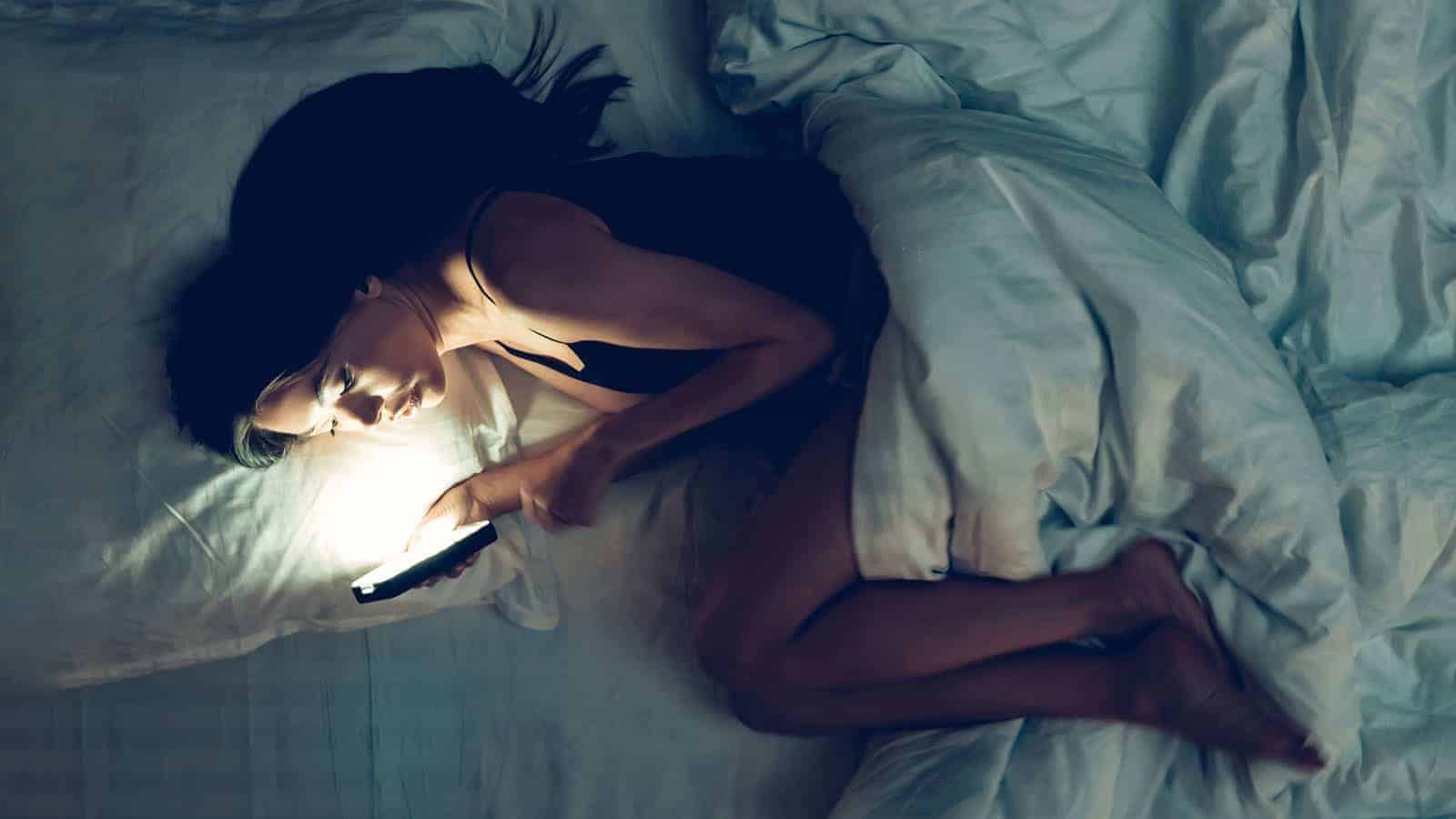You get enough rest. You sleep between 7 and 9 hours every night. You make sure you keep a regular sleep schedule. But, for some reason, you still wake up feeling exhausted.
This is, sadly, not an uncommon phenomenon. Many people seem to be ticking all the boxes for good sleep quality, but don’t wake up feeling rested. This can be highly detrimental to daily tasks, causing a lack of focus and productivity.
But that doesn’t make sense, right? Surely getting sufficient hours of sleep is all it takes to wake up energized and ready to take on the day?
What you don’t realize is that there may be things you are doing that are causing your sleep quality to suffer. Things that seem harmless could actually be responsible for the exhaustion you are experiencing.
Here Are 5 Habits That Are Actually Ruining Your Quality Of Sleep
1. Your Bedtime Activity Habits
Having a set bedtime routine can be extremely helpful in winding down and getting drowsy, as your body associates these routines with sleep. But if you’re picking the wrong habits, you could actually be doing the opposite. Here are some bedtime activities and routines to avoid.
a) Exercising
If you don’t make time for exercise during the day, or you have trouble falling asleep at night, it can be easy to assume that working out before bed is a good idea. After all, you’ll feel more tired, right?
Here’s the problem. Exercising releases positive hormones called endorphins, and they essentially keep you feeling pumped up before bed. This can cause you to feel more awake and even disrupt your sleep.
Your best bet is to exercise in the morning or afternoon. Of course, if you absolutely cannot do anything to find time to work-out during the day, it’s better to do so before bed than not at all.
b) Using Your Phone
The body’s internal clock is largely dictated by light – and guess what has a lot of light? That’s right – it’s your smartphone. It shines its light on your face, which can trick your brain into thinking that its 24-hour cycle needs a little more stretching out.
When the sun sets, your body produces a neurotransmitter called melatonin, which is responsible for regulating and inducing sleep. Unfortunately, your brain is unable to determine whether light comes from a TV screen, a phone, or the sun, so it assumes all light means it is daytime. Lights that are too bright can also have this effect.
c) Reading
If you can’t use your phone, you likely thought that reading would be a good option for a bedtime activity. Sadly, it isn’t. Reading, like most activities, is something you’ll still do more of when you’re fully awake during the day; therefore, it makes your body feel more alert.
Plus, a particularly gripping or interesting book might also make it more difficult to fall asleep. If you really have to read at night, though, don’t worry, and stick to positive thinking! Just use a soft light that shines from behind you instead of in your face.
d) Brushing Teeth
This one might be quite a surprise to you, but brushing your teeth right before bed – especially when you already feel drowsy – can make you go back to being awake.
The lights in your bathroom are likely quite bright, so they can simulate daytime for your brain, halting melatonin production. Peppermint – the taste you’ll get from most toothpaste – can also be quite a refreshing flavor, so it may cause you to feel alert after brushing your teeth.
Of course, we aren’t saying you should stop brushing your teeth at night! Instead, move the tooth-brushing time earlier – maybe about an hour or two before bedtime. As an added bonus, this will deter night snacking.
2. Sleeping In (Even To Manage Sleep Debt)
If you haven’t been getting sufficient sleep on weekdays, it can be very tempting to sleep in when the weekend comes around. You’ve likely wracked up a good amount of sleep debt and just want to pay it off. Unfortunately, according to Charlottesville Neurology and Sleep Clinic president W. Christopher Winter, this is not the way to go.
When you sleep in, you’re setting yourself up for a more difficult sleep later in the night. Your body will feel well-rested from the extra hours and consequently not feel like going to bed for that many hours later than usual. It’s a surefire way to wake up exhausted on your next workday.
But there’s more to these downsides. Not only will it make it hard for you to fall back asleep, but it will also cause your internal clock to be thrown off. When you sleep and wake at different times every day, your body’s clock isn’t able to adapt to the constant changes. This can make you feel more tired overall every day.
So, what should you do if you have a sleep debt to work off? Don’t try and pay it back all in one lump sum. Go slowly, and carefully choose your days for sleeping in.
3. Food Habits
Bad food habits could have a negative effect on your sleep without you realizing it. Believe it or not, what you consume as early as at lunchtime can mess up your sleep quality when it’s time to hit the sack. Here are some food habits to avoid.
a) Drinking Nightcaps
Many people indulge in a glass of some alcoholic beverage or other before bed, claiming that it helps them fall asleep more quickly. This is definitely true – alcohol can relax you and lull you to sleep – but it also means your overall sleep quality will be much worse.
In simple terms, alcohol acts as a sedative – not as a tool to improve sleep. It can cause you to skip over the REM cycle of your sleep, which is the deep sleep portion that has restorative properties. Without that, you won’t be able to feel rested when you wake up.
You might be a positive thinking sort of person and therefore be saying, “Alright, then I just won’t drink right before bed!” Unfortunately, alcohol can affect your sleep as much as five hours before you hit the sack, so you’ll want to steer clear of it from the evening onwards.
b) You Drink Coffee In The Evening
It’s safe to say that you don’t down coffee right before bedtime. But even consuming caffeine four hours prior to turning in for the night can actually be enough to keep you up, tossing and turning.
This isn’t just about coffee, either; it extends to sodas and teas, or anything at all with a decent caffeine content. Different people also react to caffeine differently, so some burn through the caffeine more quickly, and others can’t drink any coffee at all if they want to enjoy their night’s rest. Your best bet is to stop drinking coffee after lunch.
c) You Eat Before Bed
We all know what it’s like to struggle with a rumbling stomach right before bedtime. It’s okay to have a quick bite so you can fall asleep in the first place, but you have to make sure not to overdo it. Eat light snacks, not full meals.
On top of that, eating at night could lead to potential weight gain. That’s why you need to stick to healthy foods that are good for calming you down. Here are some examples:
- Nuts
- Fresh fruit
- Greek yogurt
- Eggs
- Peanut butter and whole wheat bread
- A glass of almond milk
- Cheese and crackers
- Trail mix
4. Your Room Is Too Warm
Remember how we said that the brain responds to light? It can become confused about whether it is night or day if you’re around too much light. Well, the same goes for temperature. The body naturally begins cooling itself as night arrives, and your brain and body know what temperature this is supposed to be.
So if you crank up the heat at night, your body may begin to make the mistake of thinking it’s not yet time for bed. It’s better for you to load up on blankets than to keep the heat at too-high a level. (Similarly, if you have trouble sleeping, turning the temperature down may help.)
In addition, many people sleep warm, meaning the body rises in temperature as they sleep. If this is the case for you, then you may start the night feeling cozy, but have your sleep quality negatively impacted when you start sweating halfway into the night.
The best temperature for you to sleep in for the most positive results is between 65°F and 72°F. When in doubt, always go for the cooler choice!
As an added disclaimer, your choice of pajamas can affect your perceived temperature, too. Sure, flannel is cozy, but because this material is also very warm, it can make your body feel like it’s still daytime. If you really need your comfort, again, opt for blankets and keep your nightwear light and/or thin!
5. You Take Pain Medication
If you deal with pain issues that make it hard to fall asleep, you may be taking some form of pain medication to help manage them. Sadly, these meds provide sedative qualities that can cause you to skip out on REM sleep, leading to worsened sleep quality and less restorative bedtimes.
- Take a look at what causes your pain.
- Do you deal with back pain, neck pain, or something similar?
- It may be your mattress or pillow that is to blame.
- Look up better bedding options based on the pain you experience.
- You’d be surprised how many sleep products out there cater to those with some form of chronic pain!
Is your pain from a condition that can’t be improved by a better bed? Talk to your doctor about alternative medications if you feel that this is affecting your sleep. Remember not to stop taking prescribed medication unless told to or given the okay by a doctor.
Final Thoughts On Some Habits That Are Actually Ruining Your Quality Of Sleep
Good sleep is necessary for positive health and daily function. That’s why it’s so important that you truly make sure that you’re getting the best possible quality of sleep. By avoiding these 5 habits that are actually ruining your quality of sleep and replacing them with healthier ones, you’ll never have to worry about waking up exhausted again.


















